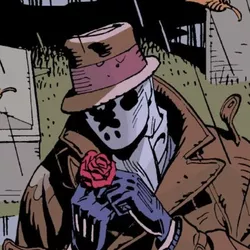- Joined
- Dec 12, 2022
What is the the concept of Death of the Author? In short, is a literary theory that argues that the meaning of a text is not determined by the author's intention, but rather by the reader's interpretation.
As time has gone on, however, "death of the author" has commonly been interpreted as "even if the author says x is this way, since it is not explicit in the story, I choose to believe something different, and my interpretation is as valid as the author's." Nowadays, because creators will frequently add information to their franchises and stories online, the extent to which we have to pay attention to their interpretations is even more hotly contested.
A fitting example about this is Allan Moore and his reaction to people reacting to Rorschach.

Moore hates the character because he is supposed to be a fascist vigilante and should not be taken as an example, but he hates the fans more to choosing him to be their favorite character in Watchmen even when it's not supposed to be this way. But at the same time, the character was made in a more sympathetic light that some can't help themselves to be charmed by the character and his ideology.
Another example can be found on JK Rowling with the Harry Potter series. Rowling has retroactively added details to it (e.g., declaring Dumbledore was gay or even mention that he had le gay seggs). Some fans reject her post-publication comments, arguing that the text itself should be the only authority and nothing else.
With all these in mind. How should an author react when a character or an ideology being implemented in the book is misinterpreted in this way? Is it necessarily a good thing? Or just sometimes?
As time has gone on, however, "death of the author" has commonly been interpreted as "even if the author says x is this way, since it is not explicit in the story, I choose to believe something different, and my interpretation is as valid as the author's." Nowadays, because creators will frequently add information to their franchises and stories online, the extent to which we have to pay attention to their interpretations is even more hotly contested.
A fitting example about this is Allan Moore and his reaction to people reacting to Rorschach.

Moore hates the character because he is supposed to be a fascist vigilante and should not be taken as an example, but he hates the fans more to choosing him to be their favorite character in Watchmen even when it's not supposed to be this way. But at the same time, the character was made in a more sympathetic light that some can't help themselves to be charmed by the character and his ideology.
Another example can be found on JK Rowling with the Harry Potter series. Rowling has retroactively added details to it (e.g., declaring Dumbledore was gay or even mention that he had le gay seggs). Some fans reject her post-publication comments, arguing that the text itself should be the only authority and nothing else.
With all these in mind. How should an author react when a character or an ideology being implemented in the book is misinterpreted in this way? Is it necessarily a good thing? Or just sometimes?